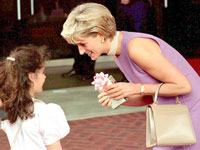French magistrate does not authorize Diana's embalming
A French magistrate claimed that she did not authorized the embalming of Princess Diana's body, and nobody from the British Embassy in Paris had discussed embalming with her.

Two High Court judges, meanwhile, overruled a coroner's decision to allow a jury to hear previous statements by paparazzi photographers who have refused to testify at the British inquest. The coroner said he would appeal the ruling.
Mohamed Al Fayed, whose son Dodi died with Diana in a car crash in Paris on Aug. 31, 1997, has claimed that the British ambassador ordered the embalming to cover up a pregnancy.
Maud Morel Coujard, who was a deputy public prosecutor in Paris in 1997, told the British inquest that she had not been informed of the decision to embalm the body and said she had had no contact with the British Embassy.
Coujard confirmed that she authorized the release of the bodies of Diana and Fayed after they had been examined. She said authorization was a legal necessity before any embalming could take place.
The British inquest jury had heard earlier that embalming was undertaken to prevent the rapid decay of the body in the warm, late-summer weather.
Al Fayed has alleged that embalming Diana in France was illegal and was carried out to conceal that she was carrying Dodi Fayed's child. He claims the embalming was conducted on instructions from MI6, the British intelligence agency, and that MI6's instructions were conveyed to then-Ambassador Michael Jay, who communicated them to Coujard.
"Is there any truth in that whatsoever?" lawyer Ian Burnett asked.
"No," Coujard replied.
The High Court justices agreed with lawyers representing the family of Henri Paul, the driver of Diana's car, that paparazzi statements should not be admitted at the inquest if they could not be challenged by questioning.
Lord Justice Scott Baker, presiding at the inquest as acting deputy coroner, had decided to allow the jury to hear written statements by the photographers.
The jury has also heard statements by witnesses and officials who have died since 1997 or cannot be located, and those have not been challenged.
Baker said he had been granted permission to appeal the ruling.
"He is concerned that the decision should not add materially to the length and cost of these inquests," said a statement distributed to journalists.
"The ruling does not mean that evidence of absent witnesses cannot be presented to the jury, but it will make it more difficult. The coroner is determined to do his utmost to ensure all relevant evidence is put before the jury," the statement said.
Subscribe to Pravda.Ru Telegram channel, Facebook, RSS!


